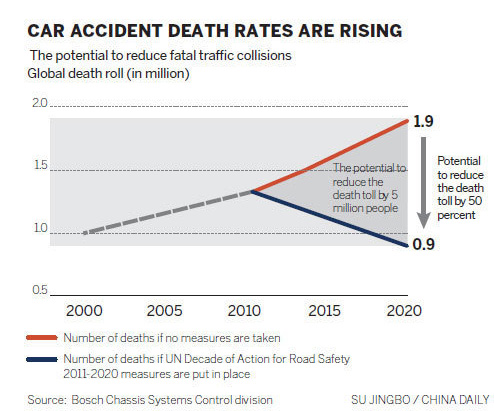In the pipeline
From next year, a complete parking assistant system, which the driver can control from outside the car, will be put into mass production by Bosch.

"Around 2020, connected vehicles will easily park by themselves, even without the drivers' supervision, through the auto park pilot and the valet parking in car technologies," predicted Carreiro.
A similar step-by-step path towards complete autonomous highway driving is also planned. An integrated cruise assist function to provide both longitudinal and lateral guidance is expected to soon be in production, said Carreiro.
Bosch tested a demonstration car equipped with highway assist on a public highway. At a top speed of 130km/h, the technician removed his hands from the steering wheel. "The highway pilot should be feasible for around 2020. The real autopilot, which also considers urban situations, however, should be expected much later," said Carreiro.
Interest in the new technologies is increasing, especially in China, according to Carreiro. "Now all the new models applying for the Five-Star rating in crash test in Europe should be equipped with at least one driver assistance system, while China's testing institution is considering including the Automatic Emergency Braking, or AEB, test from 2018."
All these technologies can be created through computerized components such as sensors, cameras and electronic control units, all of which can enable connectivity. Bosch believes its driving assistance functions are among those that are leading the way to automated driving.
As the Consumer Electronics Show in Las Vegas illustrated this year, the number of connected devices is rapidly growing and the trend towards networking is unabated.
"All electronic devices in our environment can be connected to one another via the Internet. This means that billions of single parts are set to morph into an enormous new whole. This will happen for certain. As entrepreneurs, we must see to it that we recognize and seize the ensuing opportunities," said Volkmar Denner, chairman of the Bosch board of management. The company estimated that more than 75 percent of the global population and 6.6 billion devices will be connected to the Internet by 2015, which will bring more convenience to daily life and significantly improve energy efficiency.
"The Internet of things and services is now a hot topic in China, and we expect stronger momentum in the Internet of vehicles in the coming years," said Chen Yudong, president of Bosch China. "As an innovative company, Bosch is ready for the business opportunities it brings us."
Leveraging its sensor and software technologies, Bosch is working to establish the frameworks and foundations of connectivity in China. Bosch Sensortec, a subsidiary that specializes in MEMS (Micro-Electro-Mechanical Systems) technology, launched its Asia-Pacific headquarters in Shanghai in 2013.
The company develops and markets micro-mechanical sensors for consumer electronics, mobile phones, safety systems, industrial technology and logistics. Every other smartphone across the globe now uses Bosch sensors.
While MEMS technologies are regarded as the hardware basis for connectivity, Bosch Software Innovations launched a pilot project for promoting electric vehicle's charging application in Shanghai in 2013.
